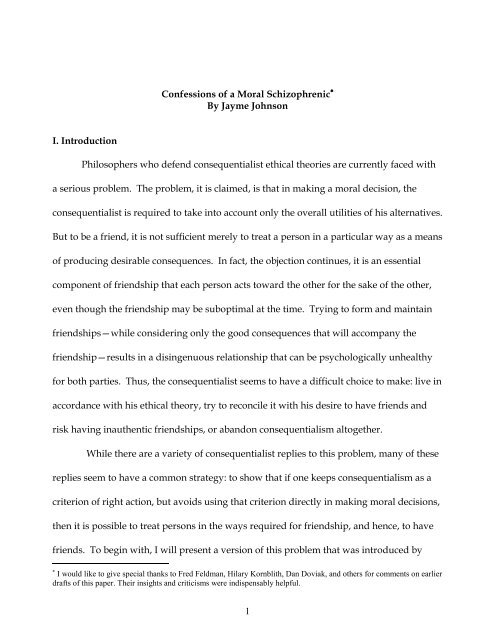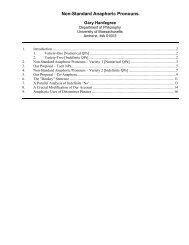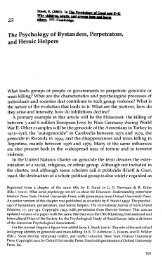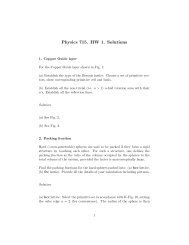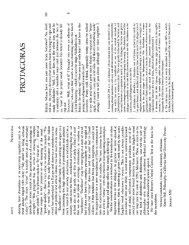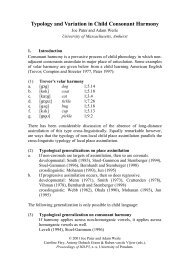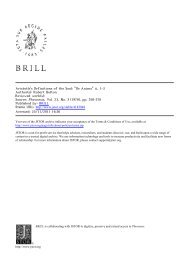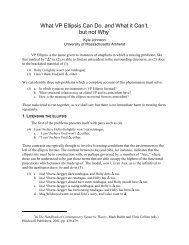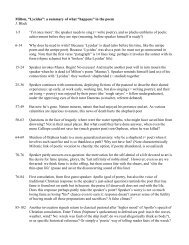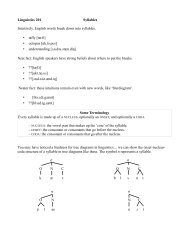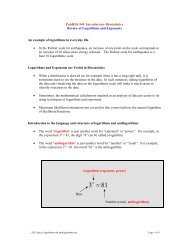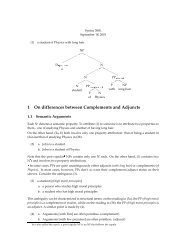1 Confessions of a Moral Schizophrenic* By Jayme Johnson I ...
1 Confessions of a Moral Schizophrenic* By Jayme Johnson I ...
1 Confessions of a Moral Schizophrenic* By Jayme Johnson I ...
Create successful ePaper yourself
Turn your PDF publications into a flip-book with our unique Google optimized e-Paper software.
<strong>Confessions</strong> <strong>of</strong> a <strong>Moral</strong> Schizophrenic ∗<br />
<strong>By</strong> <strong>Jayme</strong> <strong>Johnson</strong><br />
I. Introduction<br />
Philosophers who defend consequentialist ethical theories are currently faced with<br />
a serious problem. The problem, it is claimed, is that in making a moral decision, the<br />
consequentialist is required to take into account only the overall utilities <strong>of</strong> his alternatives.<br />
But to be a friend, it is not sufficient merely to treat a person in a particular way as a means<br />
<strong>of</strong> producing desirable consequences. In fact, the objection continues, it is an essential<br />
component <strong>of</strong> friendship that each person acts toward the other for the sake <strong>of</strong> the other,<br />
even though the friendship may be suboptimal at the time. Trying to form and maintain<br />
friendships—while considering only the good consequences that will accompany the<br />
friendship—results in a disingenuous relationship that can be psychologically unhealthy<br />
for both parties. Thus, the consequentialist seems to have a difficult choice to make: live in<br />
accordance with his ethical theory, try to reconcile it with his desire to have friends and<br />
risk having inauthentic friendships, or abandon consequentialism altogether.<br />
While there are a variety <strong>of</strong> consequentialist replies to this problem, many <strong>of</strong> these<br />
replies seem to have a common strategy: to show that if one keeps consequentialism as a<br />
criterion <strong>of</strong> right action, but avoids using that criterion directly in making moral decisions,<br />
then it is possible to treat persons in the ways required for friendship, and hence, to have<br />
friends. To begin with, I will present a version <strong>of</strong> this problem that was introduced by<br />
∗ I would like to give special thanks to Fred Feldman, Hilary Kornblith, Dan Doviak, and others for comments on earlier<br />
drafts <strong>of</strong> this paper. Their insights and criticisms were indispensably helpful.<br />
1
Michael Stocker, 1 called the problem <strong>of</strong> moral schizophrenia. I will then consider a<br />
possible solution proposed by Peter Railton. 2 Railton claims that, in using the strategy <strong>of</strong><br />
avoiding consequentialist deliberation in making decisions concerning friends and close<br />
others, a consequentialist can be what he calls “sophisticated.” As I interpret him, Railton’s<br />
further claim is that the so-called sophisticated consequentialist can avoid the problem <strong>of</strong><br />
moral schizophrenia. I then consider two different possible interpretations <strong>of</strong> Railton’s<br />
theory, one from Cocking and Oakley, and another from Mason. I intend to show that<br />
none <strong>of</strong> the versions <strong>of</strong> sophisticated consequentialism considered in this paper can<br />
withstand Stocker’s problem as I have stated it.<br />
II. Preliminaries<br />
In order to establish a basis for the dialectic <strong>of</strong> this paper, I will begin by<br />
introducing the problem in a form that both Stocker and Railton would find acceptable. In<br />
doing so, some basic terms and definitions must also be put forth.<br />
Stocker claims that part <strong>of</strong> what it is to live the good life is to have harmony<br />
between one’s reasons and motives. 3 Particularly, it is crucial that one’s ethical theory<br />
allow one to have the good life without causing disharmony between reasons and motives.<br />
To have such a disharmony, Stocker claims, causes us to be morally schizophrenic. He<br />
writes, “Not to be moved by what one values—what one believes good, nice, right,<br />
beautiful, and so on—bespeaks a malady <strong>of</strong> the spirit. Not to value what moves one also<br />
1 Stocker, Michael. “The Schizophrenia <strong>of</strong> Modern Ethical Theories” The Journal <strong>of</strong> Philosophy. Vol. LXXIII, No. 14,<br />
(August 1976) 453-466. Hereafter “SMET.”<br />
2 Railton, Peter. “Alienation, Consequentialism, and the Demands <strong>of</strong> <strong>Moral</strong>ity” Philosophy and Public Affairs, Vol. 13,<br />
No. 2 (Spring 1984), 134-171. Hereafter “ACDM.”<br />
3 SMET, p.353. My interpretation is that Stocker holds this harmony to be a necessary condition for living the good life,<br />
whatever that may be.<br />
2
espeaks a malady <strong>of</strong> the spirit. Such a malady, or such maladies, can properly be called<br />
moral schizophrenia—for they are a split between one’s motives and one’s reasons.” 4<br />
To make this clearer, some kind <strong>of</strong> understanding <strong>of</strong> what motives and reasons are is<br />
needed. Given how difficult it is to give proper definitions to either <strong>of</strong> these terms, I have<br />
chosen to ground them in an example. Since the problem <strong>of</strong> moral schizophrenia arises in<br />
cases where there is a split between one’s reasons and ones’ motives, consider the<br />
following case in which an agent’s reasons and motives come apart. Suppose that Al <strong>of</strong>ten<br />
donates large sums <strong>of</strong> money to three particular charity organizations. If asked why he<br />
does so, Al says that he really believes in what these charities stand for, that he knows the<br />
money is being put to good use, and that it makes the world a better place when people<br />
give money to these groups. Call these Al’s reasons for giving money to the charities. But<br />
suppose further, that if one were to observe Al’s acts <strong>of</strong> donating money, one would<br />
immediately notice that Al gives money to one <strong>of</strong> these three charities at fund-raisers, and<br />
only when the same group <strong>of</strong> people is there to observe his charitable behavior. If they are<br />
present and observing, Al donates. If they are not, he does not donate. It seems, then, that<br />
Al is motivated to keep up the appearance <strong>of</strong> being a charitable guy, perhaps in order to<br />
impress the group <strong>of</strong> onlookers. In this case, Al has a motive to act in the way he does,<br />
though it is not one <strong>of</strong> his reasons for acting. 5<br />
4 Ibid. 353-54<br />
5 Note that under this construal <strong>of</strong> “reason,” something is a reason only if the agent is aware that it is, and would in fact<br />
use it to justify or explain his action. Thus, in cases in which there is some fact that obtains as a result <strong>of</strong> an agent<br />
performing an act, but the agent does not know <strong>of</strong> that fact obtaining, that fact cannot be counted among an agent’s<br />
reasons. The agent need not be aware <strong>of</strong> his motives, however. What moves an agent to act in a particular way, whether<br />
that motive is a desire or a commitment to a world-view, need not be conscious.<br />
3
Since most <strong>of</strong> us, in making any decision—moral or otherwise—appeal to many<br />
reasons, and may have multiple motives, for Stocker’s schizophrenia to have weight, it<br />
must be realized that he is focusing on the main or primary reasons. Thus, in making a<br />
moral decision, these are moral reasons.<br />
Railton uses the term “alienation,” and seems to use it in such a way that cases <strong>of</strong><br />
moral schizophrenia are a subset <strong>of</strong> the set <strong>of</strong> cases <strong>of</strong> alienation. Since it is my intention to<br />
compare what these two philosophers have to say about this particular kind <strong>of</strong> alienation,<br />
I want to take a moment to show that, in the cases relevant to this paper; they are talking<br />
about the same phenomenon.<br />
Railton suggests that there is a form <strong>of</strong> alienation in morality. He tells a story about<br />
John and Anne, a married couple. According to the story, in response to a compliment<br />
about his care and affection for Anne, John replies that people should help each other out,<br />
and that in light <strong>of</strong> the fact that he is both in a good position to do so, and derives great<br />
pleasure from doing so, it just makes sense for him to care for her so. Yet, Railton<br />
continues, something seems wrong. 6 Though John is extremely moral, there is a clear<br />
sense in which Anne’s feelings could be hurt by John’s honest reply. “That he devotes<br />
himself to her because <strong>of</strong> the characteristically good consequences <strong>of</strong> doing so seems to<br />
leave her, and their relationship as such [sic], too far out <strong>of</strong> the picture—this despite the<br />
fact that these characteristically good consequences depend in important ways on his<br />
special relation to her.” 7 As a result <strong>of</strong> John’s failure to think <strong>of</strong> Anne as a reason in herself<br />
for his kind treatment <strong>of</strong> her, Railton claims, “there would seem to be an estrangement<br />
6 Ibid. 137<br />
7 Ibid. 137<br />
4
etween [his] affections and [his] rational, deliberative [self]; an abstract and<br />
universalizing point <strong>of</strong> view mediates [his] responses to others and to [his] own<br />
sentiments.” 8 Thus, we might use the term “moral alienation” to describe those cases <strong>of</strong><br />
alienation in which agents are alienated from their affections by their moral points <strong>of</strong> view.<br />
In cases <strong>of</strong> moral alienation, an agent has a commitment to his moral view that is not<br />
congruent with the types <strong>of</strong> affections he may have for others.<br />
Stocker’s similar worry in describing moral schizophrenia is that it too makes love<br />
relations lack authenticity, placing the goods <strong>of</strong> such a relation over the relation itself. An<br />
egoist, for example, in attempting to have a love relationship, will simply go through the<br />
motions, doing the pleasurable activities that accompany the relationship. Stocker gives<br />
something <strong>of</strong> a definition <strong>of</strong> the kind <strong>of</strong> love he has in mind when he claims that, “it is<br />
essential to the very concept <strong>of</strong> love that one care for the beloved, that one be able to act for<br />
the sake <strong>of</strong> the beloved. More strongly, one must care for the beloved and act for that<br />
person’s sake as a final goal; the beloved, or the beloved’s welfare or interest, must be a<br />
final goal <strong>of</strong> one’s concern and action.” 9<br />
In light <strong>of</strong> these considerations, I shall use the phrases “moral schizophrenia” and<br />
“moral alienation” interchangeably. 10 Further, when discussing love as it pertains to<br />
moral schizophrenia/alienation, I will mean love as Stocker describes it. Note that this<br />
8 Ibid. 137<br />
9 SMET 456<br />
10 Strictly speaking, the phenomenon <strong>of</strong> moral schizophrenia can be shown in two distinct kinds <strong>of</strong> alienation. One is an<br />
agent’s alienation from her affections toward a close other. The second kind is the alienation that the close other feels<br />
toward the agent in question. Thus, using Railton’s example <strong>of</strong> John and Anne above, John’s moral schizophrenia<br />
causes him to be alienated from his affections for Anne, and likewise causes Anne to feel alienated from John. However<br />
since both <strong>of</strong> these kinds <strong>of</strong> alienation point to the problem <strong>of</strong> moral schizophrenia, this distinction is not problematic<br />
for the way these terms will be used in this paper.<br />
5
construal <strong>of</strong> love need not be romantic. It should be viewed as a general, though authentic,<br />
kind <strong>of</strong> love that friends share as well.<br />
Lastly, since this paper concerns a problem for consequentialist theories, and<br />
particularly those that do not have directly consequentialist decision procedures, I will<br />
limit the ensuing discussion to consequentialist theories that are meant only to provide a<br />
criterion <strong>of</strong> rightness. 11 Call all such theories varieties <strong>of</strong> “disengaged consequentialism”<br />
(DC). 12 A DC theory will be stated in terms <strong>of</strong> the following: An action A is morally right if<br />
and only if A’s causal consequences maximize value (among its alternatives); and the<br />
theory neither is nor is intended to be a decision procedure. 13 Call an agent committed to<br />
a DC theory a dc-agent. With some <strong>of</strong> the conceptual and terminological matters cleared<br />
up, and the scope set, I shift my focus back on Stocker, and provide an overall context for<br />
the problem <strong>of</strong> moral schizophrenia.<br />
III. Context: the Dilemma<br />
The problem <strong>of</strong> moral schizophrenia can be couched in terms <strong>of</strong> the following<br />
dilemma. 14 The dc-agent either embodies his reasons in his motives or does not. If he<br />
does embody his reasons in his motives, then he sacrifices his ability to be a real friend, or<br />
11 For a good treatment <strong>of</strong> this issue <strong>of</strong> whether consequentialist theories ought to be action guiding as well as provide a<br />
criterion <strong>of</strong> rightness, see R. Eugene Bales, “Act-Utilitarianism: Account <strong>of</strong> Right-Making Characteristics Or Decision-<br />
Making Procedure?” American Philosophical Quarterly. Vol. 8, 3 (July 1971)<br />
12 In calling a theory <strong>of</strong> the kind “disengaged consequentialism,” I follow James Lenman. See Lenman’s<br />
“Consequentialism and Cluelessness” Philosophy and Public Affairs 29, no.4. Princeton University Press, (2000). I am<br />
limiting the scope <strong>of</strong> the paper to just these brands <strong>of</strong> consequentialism because I believe they provide the *strongest<br />
arm* with which to combat the current problem. This limitation <strong>of</strong> scope, then, is by no means intended to imply that<br />
moral schizophrenia does not afflict the broad range <strong>of</strong> ethical theories Stocker claims it does.<br />
13 What value ought to be maximized in determining the rightness <strong>of</strong> an action will vary based on a DC theory’s<br />
axiology. For example, hedonistic DC theories will be stated in terms <strong>of</strong> maximizing hedonic utility.<br />
14 Many thanks are due to Dan Doviak for presenting Stocker’s problem <strong>of</strong> moral schizophrenia as a dilemma. I follow<br />
him in the basic structure <strong>of</strong> this dilemma and believe it frames the problem excellently. Doviak gave this structure to<br />
Stocker’s argument in a seminar talk called “A Problem for Disengaged Consequentialism” in Fred Feldman’s Phil 760<br />
Seminar, (March 7, 2005). He has since written a paper <strong>of</strong> the same name.<br />
6
enter into genuinely loving relationships. This is unacceptable, as these are pr<strong>of</strong>ound<br />
sources <strong>of</strong> pleasure, happiness, etc. If he does not embody his reasons in his motives, then<br />
he becomes morally schizophrenic, and this too is an unacceptable situation. So DC<br />
theories are unacceptable. While Stocker does not state the problem in terms <strong>of</strong> this<br />
dilemma, there is good evidence to believe he would approve. He writes, “It is not<br />
possible for moral people, that is, people who would achieve what is valuable, to act on<br />
these ethical theories, to let them comprise their motives. People who do let them<br />
comprise their motives will, for that reason, have a life seriously lacking in what is<br />
valuable.” 15<br />
The problem first arises when dc-agents attempt to embody their reasons in their<br />
motives. On this first horn <strong>of</strong> the dilemma, the dc-agent is aware <strong>of</strong> the value he places on<br />
the goods <strong>of</strong> friendship. He will attempt to have friends, but find he cannot consistently<br />
form and maintain a friendship given his consequentialist mode <strong>of</strong> thinking. The dc-agent<br />
may then attempt to reconcile this problem by ignoring his consequentialist motives for<br />
friendship, causing disharmony in his reasons and motives for having a particular friend.<br />
If the dc-agent chooses to ignore his consequentialist motives, he has then moved to the<br />
second horn <strong>of</strong> the dilemma, becoming morally schizophrenic. The condition <strong>of</strong> moral<br />
schizophrenia can then manifest itself in a variety <strong>of</strong> ways. Stocker points out some<br />
examples <strong>of</strong> “modest cases”: weakness <strong>of</strong> will, indecisiveness, guilt, shame, self-deception,<br />
rationalization, and annoyance with oneself. 16<br />
15 SMET 455<br />
16 Ibid. 454<br />
7
Thus, following the dilemma, the dc-agent must choose between having friendships,<br />
love relations—and living as a moral schizophrenic—or having harmony between his<br />
reasons and motives, and dealing with the fact that authentic friendship and love is<br />
impossible given his ethical theory.<br />
In the following passage, Stocker explains how hedonistic egoists get caught in the<br />
tangles <strong>of</strong> this dilemma. I quote him at length.<br />
Hedonistic egoists take their own pleasure to be the sole justification <strong>of</strong> acts,<br />
activities, ways <strong>of</strong> life; they should recognize that love, friendship, affection, fellow<br />
feeling, and community are among the greatest (sources <strong>of</strong>) personal pleasures.<br />
Thus, they have good reason, on their own grounds to enter into such relations. But<br />
they cannot act in the ways required to get those pleasures, those great goods, if<br />
they act on their motive <strong>of</strong> pleasure-for-self. They cannot act for the sake <strong>of</strong> the<br />
intended beloved, friend, and so on; thus they cannot love, be or have a friend, and<br />
so on. 17<br />
I think this quotation contains an important argument. Though the argument is given<br />
specifically against hedonistic egoists, the problem can easily be generalized to be against<br />
any consequentialist theory—dc-theories included. If so, dc-agents, when attempting to be<br />
friends or have love relations, will find themselves very lonely, or worse still, will move to<br />
the other horn <strong>of</strong> the dilemma, becoming morally schizophrenic. In the next section I<br />
present this argument with the modifications necessary for it to target DC theories. As I<br />
suggested above, this argument is intended to show how dc-agents seem to be forced into<br />
moral schizophrenia by their own ethical theories. Call the following argument the<br />
argument to schizophrenia (ATS).<br />
17 Ibid. 457<br />
8
IV. The Argument<br />
1. If S is a dc-agent, then S has good reason to enter into relations that are among<br />
the greatest sources <strong>of</strong> personal pleasure [or whatever value the agent’s theory<br />
claims that rightness is the maximization <strong>of</strong>, e.g. happiness].<br />
2. Love and friendship are among the greatest (sources <strong>of</strong>) personal pleasures [or,<br />
happiness, etc.].<br />
3. Thus: If S is a dc-agent, then S has good reason to enter into love and friendship<br />
relations.<br />
4. [But] If S is a dc-agent, S cannot act in the ways required to get those pleasures (S<br />
cannot act for the sake <strong>of</strong> the intended beloved or friend).<br />
5. If an agent cannot act for the sake <strong>of</strong> the beloved, friend, then that agent cannot<br />
love, be or have a friend.<br />
6. Therefore: If S is a dc-agent, then S cannot love, be or have a friend.<br />
7. Therefore: If S is a dc-agent, S has good reason to enter love and friendship<br />
relations, but it’s not the case that S can love, be or have a friend (from 3&6).<br />
In light <strong>of</strong> (7), the dc-agent will want to have friends, but will not be able to use his ethical<br />
theory to motivate this activity. This prompts the move to moral schizophrenia.<br />
The first lemma <strong>of</strong> this argument (1-3) seems right. No one who ever was, or had a<br />
friend—or felt love <strong>of</strong> any kind for that matter—would deny the enriching effects these<br />
relations have for one’s quality <strong>of</strong> life. Furthermore, even though the dc-agent believes<br />
that his criterion <strong>of</strong> rightness is separated from how he makes decisions pertaining to<br />
friends, it seems that if it is even possible that there is a case in which the dc-agent must<br />
sacrifice a friendship in order to make some other morally right decision, then premise 4 is<br />
true. Since we should grant the truth <strong>of</strong> premise 5 as obvious, the second lemma (4-6)<br />
seems also to hold. Thus, ATS seems to pose a serious problem for any DC theory.<br />
9
One way a dc-agent may try to get out <strong>of</strong> this problem is to deny premise 4.<br />
Premise 4, the dc-agent could argue, overlooks the fact that DC theories do not employ<br />
consequentialist decision procedures. True dc-agents, the objection might continue, can,<br />
and do, act in ways required to bring about the pleasures <strong>of</strong> friendship and love, and need<br />
not be committed to maximizing value in cases where the agent must make a decision that<br />
will affect his friendships. Hence, the dc-agent can make choices congruent with the<br />
proper treatment <strong>of</strong> his friends, even in cases in which that decision is not valuemaximizing.<br />
For this counterclaim to be acceptable, however, it needs to be shown that it<br />
is consistent for someone to be a dc-agent and still do things for the sake <strong>of</strong> others. I will<br />
now attempt to develop this possible objection to the argument.<br />
V. Sophisticated Consequentialism<br />
So long as the theory in question maintains an impersonal criterion <strong>of</strong> right—one<br />
that focuses strictly on rightness, or goodness, etc. in the abstract—the theory will be, as<br />
Stocker puts it, dehumanizing. 18 Railton, however, thinks that there is a solution to this<br />
problem in what he calls sophisticated consequentialism; he explains it in terms <strong>of</strong><br />
subjective and objective positions. Subjective consequentialism is the view that whenever one<br />
faces a choice <strong>of</strong> actions, one should attempt to determine which act <strong>of</strong> those available<br />
would most promote the good, and should then act accordingly. 19 John, from the example<br />
given above, clearly represents the subjective consequentialist. Note that since the<br />
subjective consequentialist attempts to employ a consequentialist-oriented decision<br />
18 SMET p. 460<br />
19 ACDM p. 152<br />
10
procedure, subjective consequentialism is not a DC theory. Objective consequentialism is the<br />
view that the criterion <strong>of</strong> rightness <strong>of</strong> an act or course <strong>of</strong> action is whether it in fact would<br />
promote the good <strong>of</strong> those acts available to the agent. 20 An objectively consequentialist act<br />
(or life), Railton explains, is that act (or life) <strong>of</strong> those available to the agent that would<br />
bring about the best consequences. Finally, Railton asserts, a sophisticated consequentialist is<br />
someone who has a standing commitment to leading an objectively consequentialist life,<br />
but who need not set special stock in any particular form <strong>of</strong> decision making and therefore<br />
does not necessarily seek to lead a subjectively consequentialist life. 21 Given that the<br />
sophisticated consequentialist is not committed to any particular decision procedure, and<br />
is committed to objective consequentialism only as a criterion <strong>of</strong> rightness, sophisticated<br />
consequentialism is a DC theory. To better illustrate the position <strong>of</strong> the sophisticate,<br />
Railton <strong>of</strong>fers a new character, Juan.<br />
Juan is married to Linda, and like John, is viewed as a model husband. But when<br />
asked about his treatment <strong>of</strong> his wife, he gives a much different kind <strong>of</strong> response than John<br />
gives. Juan’s response is “I love Linda. I even like her. So it means a lot to me to do things<br />
for her. After all we’ve been through, it’s almost a part <strong>of</strong> me to do it.” 22 Juan, Railton<br />
alleges, has developed standing dispositions to treat Linda in this way, and is not required<br />
constantly to evaluate whether this relationship is value-maximizing. Since Juan’s<br />
decisions concerning Linda are guided by standing dispositions, Juan can be a<br />
consequentialist, and be involved with Linda for Linda’s sake.<br />
20 Ibid. 152<br />
21 Ibid. 153<br />
22 See Ibid. 150 for the complete Juan and Linda story.<br />
11
Railton points out that even though someone like Juan does things for the sake <strong>of</strong><br />
others, this need not prevent him from realizing that he enjoys the consequences <strong>of</strong> doing<br />
those things. He writes<br />
A spouse who acts for the sake <strong>of</strong> his mate may know full well that this is a source<br />
<strong>of</strong> deep satisfaction for him—in addition to providing him with reasons for acting<br />
internal to it, the relationship may also promote the external goal <strong>of</strong> achieving<br />
happiness. Moreover, while the pursuit <strong>of</strong> happiness may not be the reason he<br />
entered or sustains the relationship, he may also recognize that if it had not seemed<br />
likely to make him happy he would not have entered into it, and that if it proved<br />
over time to be inconsistent with his happiness he would consider ending it. 23<br />
The further point embedded in this passage is that the SC-agent, even though he acts<br />
toward close others for their own sakes, need not continue to do so if it proves<br />
disadvantageous in the long run. There seems to be fine line here that the SC agent will<br />
have to walk. On the one hand, the SC-agent cannot scrap a relationship simply because it<br />
is inconvenient in some way. On the other hand, he must still keep track <strong>of</strong> the overall<br />
consequences produced by his being in that relationship. In order to live as a<br />
consequentialist but not be committed to a consequentialist decision procedure, then, the<br />
sophisticated consequentialist must attempt to meet a counterfactual condition: while he<br />
ordinarily does not do what he does simply for the sake <strong>of</strong> doing what’s right, he would<br />
seek to lead a different sort <strong>of</strong> life if he did not think his were morally defensible. 24<br />
Hence, Juan is supposed to avoid the problem <strong>of</strong> moral schizophrenia so long as he<br />
tries, to the best <strong>of</strong> his abilities, to meet the counterfactual condition. In doing so, Juan can<br />
act for Linda’s sake because he will have developed a disposition to treat Linda as an end;<br />
23 Ibid. 141<br />
24 Ibid. 151<br />
12
and where Anne was made to feel alienated by John’s moral schizophrenia, Linda would<br />
not feel alienated by Juan’s reasons for treating her as he does. This story about Juan<br />
seems to provide impetus for the rejection <strong>of</strong> premise 4 <strong>of</strong> ATS. Juan seems to be living<br />
pro<strong>of</strong> that a dc-agent qua sophisticated consequentialist can act in the ways required to<br />
bring about the goods <strong>of</strong> friendship and love. After all, he does say all the right things<br />
when asked about his stellar treatment <strong>of</strong> his wife.<br />
I don’t think Stocker would be moved by the Juan story. He might argue, in fact,<br />
that the sophisticated consequentialist can deny premise 4 <strong>of</strong> ATS only because he has<br />
already shifted into a state <strong>of</strong> moral schizophrenia, and that Railton has merely restated<br />
the problem as a solution. The extent to which the sophisticated consequentialist can reject<br />
this seems to be equivalent to the extent that he can meet and abide by the counterfactual<br />
condition. In order to determine whether this is plausible, three questions must be<br />
answered. The first question is what the proper understanding <strong>of</strong> the counterfactual<br />
condition is. The second question, “how can the consequentialist meet the counterfactual<br />
condition,” can be answered only after the first. Third, the question <strong>of</strong> whether all <strong>of</strong> this<br />
will get the consequentialist out the grips <strong>of</strong> moral schizophrenia will be based on the<br />
answers to the first two.<br />
VI. The Counterfactual Condition<br />
Recall that Railton’s counterfactual condition is stated as follows: while the<br />
sophisticated consequentialist ordinarily does not do what he does simply for the sake <strong>of</strong><br />
doing what’s right, he would seek to lead a different sort <strong>of</strong> life if he did not think his were<br />
13
morally defensible. The key to understanding how an agent can divorce his motives from<br />
his criterion <strong>of</strong> right, and further, how it is—as Railton proposes—that the agent could<br />
potentially seek to lead a different sort <strong>of</strong> life were his current life no longer morally<br />
defensible, is in the adoption and regulation <strong>of</strong> standing dispositions. 25 We are told that<br />
Juan, for example, has a standing disposition to treat his wife Linda as an end in herself.<br />
The sophisticated consequentialist makes everyday decisions on the basis <strong>of</strong> these<br />
developed dispositions. These dispositions may help the sophisticated consequentialist do<br />
things like block the regress <strong>of</strong> calculating utilities in that he may “develop standing<br />
dispositions to give more or less attention to decisions upon their perceived importance,<br />
the amount <strong>of</strong> information available, the predictability <strong>of</strong> his choice, and so on.” 26 More<br />
importantly, the sophisticated consequentialist can develop a disposition to avoid<br />
characteristically self-defeating modes <strong>of</strong> deliberation entirely, and that doing so need not<br />
be seen as self-deceptive or as acting in bad faith. Railton writes, “He can fully recognize<br />
that he is developing the dispositions he does because they are necessary for promoting<br />
the good. Of course, he cannot be preoccupied with this fact all the while, but then one<br />
cannot be preoccupied with anything without this interfering with normal or appropriate<br />
patterns <strong>of</strong> thought and action.” 27<br />
The result is a two-tiered ethical theory with the counterfactual condition<br />
functioning as a mediator between the two levels <strong>of</strong> thinking: an objective consequentialist<br />
25 A disposition can be roughly construed as a functional state which takes situations as inputs and delivers actions.<br />
26 Ibid. 154<br />
27 Ibid. 154<br />
14
criterion <strong>of</strong> right, and some kind <strong>of</strong> dispositional decision procedure. 28 Let’s suppose, then,<br />
that the proper understanding <strong>of</strong> the counterfactual condition is just this (and the answer<br />
to question one): it is the way in which the sophisticated consequentialist regulates his set<br />
<strong>of</strong> dispositions so that his dispositions will be consistent with an overall consequentialist<br />
framework. Although Railton does not state it this way, it seems that the procedure for<br />
first adopting a set <strong>of</strong> dispositions—the starting point—will have to be one in which the<br />
sophisticated consequentialist considers all the sets <strong>of</strong> dispositions that are possible for<br />
him, consider <strong>of</strong> each set how much utility would be produced if he were to adopt it, then<br />
adopt that set which maximizes utility. 29 If this understanding <strong>of</strong> the counterfactual<br />
condition is correct, then it becomes an empirical matter whether a person can actually<br />
meet it. Answering question two, then, will be determined by the way in which the<br />
sophisticate moves between the levels <strong>of</strong> thinking. 30 There are, to my mind, two ways in<br />
which the sophisticated consequentialist could use his criterion <strong>of</strong> right to regulate his<br />
dispositions, and thus two subtly different versions <strong>of</strong> the theory. The second and third<br />
questions will have to be asked <strong>of</strong> both these interpretations.<br />
28 While Hare also has a two-tiered structure to his ethical theory, the similarities seem to end there. I say “seem”<br />
because after looking more carefully at Hare’s theory, I am not entirely sure how it is supposed to work. [This, <strong>of</strong> course,<br />
is not a reason to think that this exhausts the similarities between to the two theories, only that I cannot see them now.]<br />
Hare’s and Railton’s theories appear similar in a general way in that both seem to prescribe two different modes <strong>of</strong><br />
moral thinking: a critical level which will be consequentialist, and an everyday method <strong>of</strong> moral thinking, which will be<br />
established in some way on the basis <strong>of</strong> the critical level. See Hare’s <strong>Moral</strong> Thinking. Oxford University Press, New<br />
York, 1981. For a treatment <strong>of</strong> similar issues raised by Williams against Hare and Hare’s replies, see Hare and Critics.<br />
Oxford University Press, New York, 1988, p.185-196 & p.287-293.<br />
29 Fred Feldman has pointed out to me that this is roughly equivalent to Robert Adams’ motive utilitarianism. Railton is<br />
aware <strong>of</strong> the similarities and argues against the direct comparison <strong>of</strong> his view to Adams’. SeeACDM.<br />
30 Hare, for reasons unknown to me, believed that the question <strong>of</strong> how one moves between the levels <strong>of</strong> thinking <strong>of</strong> his<br />
theory is not a philosophical question. I disagree. I think that determining whether there can be better or worse ways to<br />
regulate our dispositions using an overall consequentialist schema is an important philosophical question.<br />
15
Interpretation 1:<br />
The first interpretation <strong>of</strong> the counterfactual condition comes from Cocking and<br />
Oakley. 31 They begin their interpretation by putting the condition in terms <strong>of</strong> a regulator<br />
and a regulative ideal. They write, “A helpful way <strong>of</strong> putting the sophisticated<br />
consequentialist position is by saying that maximization <strong>of</strong> agent-neutral value will be his<br />
regulative ideal. To say that an agent has a regulative ideal is to say that he has<br />
internalized a certain conception <strong>of</strong> correctness or excellence, in such a way that he is able<br />
to adjust his motivation and conduct so that it conforms—or at least does not conflict—<br />
with that standard.” 32 Further, they hold that a regulative ideal can govern our behavior<br />
without becoming one <strong>of</strong> our motives. Since the regulative ideal is “an internalized<br />
normative disposition to direct one’s actions in certain ways,” 33 the sophisticated<br />
consequentialist can ground his motives for friendship however he see fit. This move<br />
seems to preserve the thrust <strong>of</strong> Railton’s strategy to get the sophisticated consequentialist<br />
out <strong>of</strong> the throes <strong>of</strong> moral schizophrenia, allowing for a unity between reasons and<br />
motives.<br />
On the basis <strong>of</strong> this notion <strong>of</strong> a regulative ideal, Cocking and Oakley then argue that<br />
it is still unclear, in Railton’s example, why Juan’s relationship with Linda should qualify<br />
as a case <strong>of</strong> genuine love or friendship. While it can be granted that he acts for her sake,<br />
“there are many different kinds <strong>of</strong> relationships where we can favor others with our time<br />
and attention, and moreover, act for their sake, but which would not thereby necessarily<br />
31 Dean Cocking and Jason Oakley “Indirect Consequentialism, Friendship, and the Problem <strong>of</strong> Alienation,” Ethics. 106<br />
(October 1995: 86-111. Hereafter, “ICFPA”<br />
32 ICFPA p. 89-90<br />
33 Ibid. 90 To me, this sounds a lot like a fancy way <strong>of</strong> saying “conscience.”<br />
16
qualify as friendships.” 34 After all, Juan’s regulative ideal is still consequentialist, and on<br />
these grounds, they argue, acting for one’s sake does not entail being a friend. Moreover,<br />
Juan’s having a deep sense <strong>of</strong> care and affection for Linda does not, in itself, entail that<br />
Juan is Linda’s friend, or that he has genuine love for her.<br />
Cocking and Oakley explain that the reason Juan might hold these feelings for<br />
Linda, act for her sake, and still not be a friend is that having a friend, as opposed to being<br />
a teacher, or doctor—who also may care for others, and act for their sake—involves a<br />
specific set <strong>of</strong> acceptance and terminating conditions that are proper for friendships. Call<br />
acceptance conditions the conditions under which an agent would enter a friendship<br />
relationship. Correlatively, call terminating conditions the conditions under which a person<br />
would withdraw from a relationship. 35 Without intending to employ a controversial use <strong>of</strong><br />
the following term, call a person’s set <strong>of</strong> acceptance and terminating conditions his set <strong>of</strong><br />
governing conditions. 36 Using this manner <strong>of</strong> speech, Railton’s sophisticated<br />
consequentialist may appeal to the counterfactual condition, saying that he has as part <strong>of</strong><br />
his regulative ideal the governing conditions conducive to being a friend because this is<br />
value-maximizing, that if it failed to do so would stop, and that, “this does not entail that<br />
the agent is thereby moved by his concern to maximize agent-neutral value in his loves or<br />
friendships.” 37 Hence, granting that an agent’s motives can be separated from his criterion<br />
<strong>of</strong> right, Cocking and Oakley interpret the counterfactual condition (call this interpretation<br />
COI) to be mediating upon each particular friendship relation that an agent engages in.<br />
34 Ibid. 92<br />
35 Ibid. 94<br />
36 I am merely following Cocking and Oakley in the use this term to refer to an agent’s set <strong>of</strong> acceptance and<br />
terminating conditions for a relationship. See Ibid. 96<br />
37 Ibid. 94<br />
17
The sophisticated consequentialist, on this interpretation, can meet the condition by<br />
checking the state <strong>of</strong> each <strong>of</strong> his friendships against his regulative ideal periodically to see<br />
if the relationship is still value-maximizing, without having to admit that his motives for<br />
friendship are separated from his reasons. This answers question two.<br />
However, Cocking and Oakley believe that while it is good to make the distinction<br />
between motives and governing conditions, this does not get the sophisticated<br />
consequentialist out <strong>of</strong> trouble. 38 They claim that it is “an unjustified leap for<br />
consequentialists to think that appealing to this distinction between [governing conditions]<br />
and motives establishes their claim that being governed in these ways by the condition <strong>of</strong><br />
maximization <strong>of</strong> agent-neutral value is compatible with the motivational disposition<br />
proper to relationships <strong>of</strong> friendship and love.” 39 One way to illustrate this is to return to<br />
Railton’s examples <strong>of</strong> John and Juan. Though Juan differs from John in that his motives<br />
for friendship are separate from his criterion <strong>of</strong> right (his regulative ideal), both Juan and<br />
John, as consequentialists, have the same governing conditions for particular friendship<br />
relations, and Juan and Linda’s relationship should not be viewed as any more authentic<br />
than John and Anne’s does.<br />
If we take Cocking and Oakley to mean the same with the phrase ‘agent-neutral’ as<br />
I in my use <strong>of</strong> ‘impersonal,’ then the following argument seems to capture their position.<br />
Call this the argument from COI.<br />
38 Ibid. 94<br />
39 Ibid. 96<br />
18
1. If an ethical theory has an impersonal set <strong>of</strong> governing conditions which serves to<br />
regulate an agent’s disposition for a particular friendship, then the acceptance <strong>of</strong><br />
that theory by an agent cannot provide the agent with the psychological disposition<br />
necessary to facilitate and maintain that friendship.<br />
2. Sophisticated consequentialism has an impersonal set <strong>of</strong> governing conditions<br />
which serves to regulate an agent’s disposition for a particular friendship.<br />
3. Therefore the acceptance <strong>of</strong> sophisticated consequentialism by an agent cannot<br />
provide the agent with the psychological disposition necessary to facilitate and<br />
maintain a particular friendship.<br />
To put this conclusion in terms <strong>of</strong> the overall dialectic in this paper, if Cocking and Oakley<br />
are correct, then the sophisticated consequentialist is no longer justified in denying<br />
premise 4 <strong>of</strong> ATS. The sophisticated consequentialist who compares each disposition to<br />
treat a particular friend in the required ways against his regulative ideal will be required<br />
to have in his set <strong>of</strong> terminating conditions a condition that will morally obligate him to<br />
end the particular friendship-disposition if it becomes suboptimal. Were this to occur, the<br />
SC-agent would then no longer be able to appeal to that disposition as justification for the<br />
friendship. Without that, the SC-agent is back into the original quagmire, perhaps<br />
desiring to maintain the friendship, but having this desire conflict with what his ethical<br />
theory requires <strong>of</strong> him.<br />
What the argument from COI shows, then, is that while the sophisticated<br />
consequentialist can have harmony between his reasons and motives, given that he will<br />
still be morally required under certain circumstances to abandon his disposition for being<br />
19
a friend to a particular person, he will not have the psychological disposition necessary to<br />
be a friend, and still cannot be a friend in the sense that Stocker elucidates. This is all that<br />
needs to be shown for the sophisticated consequentialist to slide over to the second horn <strong>of</strong><br />
the above dilemma, and become morally schizophrenic. Hence, if Cocking and Oakley are<br />
correct in their interpretation <strong>of</strong> the counterfactual condition, the answer to question three<br />
is “no”, moral schizophrenia is just as much a problem for the sophisticated<br />
consequentialist as it is for any other dc-agent.<br />
I agree with this conditional conclusion. If a sophisticated consequentialist accepts<br />
COI, and attempts to regulate his disposition to act in a particular way toward each and<br />
every person, he will do little better than John in alienating his friends, and himself. This<br />
will put the sophisticated consequentialist on the fast track to moral schizophrenia. I<br />
believe, however, that this conditional is only trivially true. I don’t think Cocking and<br />
Oakley have it right. On COI, the SC-agent is required to develop a particular standing<br />
disposition to treat a particular friend in the ways required for authentic friendship. For<br />
example, Juan, on COI has an authentic relationship with Linda because he has developed<br />
a particular treat-Linda-for-Linda’s-sake-disposition, and regulates that disposition with<br />
his consequentialist regulative ideal. Yet this gives Juan little or no advantage over simply<br />
regulating the friendship itself. Juan’s disposition in this case would provide no added<br />
buffer. Hence, Juan would lose the apparent harmony between his reasons and motives<br />
for treating Linda properly as soon as either the relationship would become suboptimal, or<br />
he were faced with a choice between maintaining the relationship and some other utilitymaximizing<br />
alternative.<br />
20
Notice, however, that premise 2 <strong>of</strong> the argument from COI is true only if Cocking<br />
and Oakley’s interpretation <strong>of</strong> the counterfactual condition is correct. Perhaps there is a<br />
better interpretation available. In the next section I explore a second interpretation that<br />
comes from Elinor Mason. 40 On her interpretation, premise 2 <strong>of</strong> the argument from COI is<br />
false.<br />
Interpretation 2:<br />
Rather than interpret Railton as suggesting that each individual relationshipdisposition<br />
be regulated, Mason thinks that the counterfactual condition mediates between<br />
the regulative ideal and a set <strong>of</strong> broader dispositions. Mason sees Railton as arguing that<br />
the good sophisticated consequentialist, in judging what to do, looks at dispositions rather<br />
than actions, “and the disposition which will produce the most good overall may not be a<br />
disposition to choose the act which appears to be the best on each occasion.” 41 In the case<br />
<strong>of</strong> friendships, then, the condition would not mediate between the regulative ideal and a<br />
disposition for friendship with a particular person, but on the disposition proper to being<br />
a good friend overall. On this interpretation, “the sophisticated consequentialist will not<br />
give up a relationship whenever that relationship is less than optimal” 42 as would be<br />
suggested by the Cocking and Oakley interpretation. Someone holding this second<br />
interpretation, as I mentioned earlier, would reject premise 2 <strong>of</strong> the argument from COI.<br />
The reason for this should now be clear. The Masonian sophisticate uses her regulative<br />
40 Elinor Mason. “Can an Indirect Consequentialist Be a Real Friend?” Ethics, Vol. 108, No. 2 (Jan. 1998), 386-393.<br />
Hereafter “CICRF”.<br />
41 Ibid. 388<br />
42 CICRF p. 387. Mason defines “optimal” as the best an agent can do, not the best that could possibly be done.<br />
21
ideal to govern a general pro-friendship disposition rather than over each disposition for<br />
the treatment <strong>of</strong> a particular friend.<br />
The manner in which the counterfactual condition mediates between the criterion <strong>of</strong><br />
right/regulative ideal and the set <strong>of</strong> dispositions, on Mason’s interpretation, creates a sort<br />
<strong>of</strong> hierarchy <strong>of</strong> dispositions. The governing conditions proper for friendships would be<br />
regulated by a general pro-friendship disposition, and the acceptance/terminating<br />
conditions would themselves be dispositional. In this case, the terminating condition<br />
would be a disposition to cease having a pro-friendship disposition if it could no longer be<br />
argued that the best lives are had by those with friendships, and that it is a better world in<br />
which such relationships exist. So long as these two conclusions can be upheld empirically,<br />
the sophisticated consequentialist may keep and maintain the pro-friendship disposition,<br />
and thus engage in true friendships. The agent meets the counterfactual condition by<br />
developing this structure <strong>of</strong> dispositions and changes a given disposition only if it is no<br />
longer morally defensible to keep that disposition. (This answers question two.) A major<br />
advantage to this interpretation, Mason argues, is that under it “the circumstances in<br />
which a pro-friendship disposition would cease to be optimal are much more drastic than<br />
the circumstances in which a particular relationship would cease to become optimal.” 43<br />
The difference between the Cocking and Oakley and the Mason interpretations is<br />
easily seen in the following example. Dick is a sophisticated consequentialist who recently<br />
discovered that he could make a substantial improvement in the conditions <strong>of</strong> a certain<br />
third-world nation. In order to do so, however, Dick would have to end his life as he now<br />
43 Ibid. 392<br />
22
knows it and move there, devoting himself entirely to the task. Dick has many friends that<br />
he cares deeply for. Of all those who Dick considers his friend, he cares most deeply for<br />
his long-term girlfriend Joan. Dick knows that moving away and starting a new life means<br />
severing his ties with Joan, and that there is little or no chance that they will be reunited.<br />
If Dick follows the model <strong>of</strong> sophisticated consequentialism <strong>of</strong>fered by Cocking and<br />
Oakley’s interpretation, he must compare his relationship with Joan against the<br />
impersonal greater good <strong>of</strong> improving a third world nation. Since his regulative ideal is<br />
consequentialist, and he uses the counterfactual condition to mediate between that ideal<br />
and his particular relationships, he seems committed to breaking his ties and moving<br />
away. On the Mason interpretation, since he has no reason within the context <strong>of</strong> the<br />
relationship itself to end it, in order to be committed to moving away, Dick must be<br />
prepared to say that it is a better world in which one has a disposition to give up having a<br />
pro-friendship disposition if given an opportunity to help strangers. Since a world in<br />
which people give up friendships for impersonal goods is effectively a world with no<br />
friends at all, and Dick knows a world where people have friendships like his with Joan is<br />
better than one without, Dick should stay, continue to have a pro-friendship disposition,<br />
and continue being a loving friend to Joan [and his other friends].<br />
So on this second interpretation, Mason argues, the sophisticated consequentialist<br />
can have harmony between his reasons and motives, and also have friendships. The<br />
problem with this interpretation, however, is that Mason’s view <strong>of</strong>fers no principled<br />
reason that Dick in the above example should have to choose between maximizing some<br />
impersonal good, and giving up his pro-friendship disposition specifically. Perhaps<br />
23
Mason could attempt to argue along the following lines. The reason why Dick must be<br />
ready to develop a disposition to give up his pro-friendship disposition when it conflicts<br />
with the greater good <strong>of</strong> helping strangers is that this is precisely what Dick must do in<br />
order to be moved to relocate his life. If there were some problems that led him to end<br />
certain friendships independent <strong>of</strong> the opportunity to improve the conditions <strong>of</strong> the third<br />
world nation, then it is feasible that Dick could end all <strong>of</strong> his friendships, each for those<br />
independent reasons. But to give up all <strong>of</strong> them for a consequentialist reason is simply to<br />
fall back into the Cocking and Oakley interpretation, where each particular friendship<br />
would be regulated by the consequentialist ideal.<br />
I don’t think this line <strong>of</strong> argument gets at the heart <strong>of</strong> the matter. The problem with<br />
Mason’s view, as I see it, is that it seems wholly arbitrary that <strong>of</strong> all <strong>of</strong> Dick’s dispositions,<br />
it is his general pro-friendship disposition that must be put to the test. Let’s not forget the<br />
fact that Dick is a consequentialist, and should be selecting, maintaining—and possibly<br />
editing—all <strong>of</strong> his dispositions by holding them to consequentialist ideal <strong>of</strong> utility<br />
maximization. Mason must explain, then, why Dick is required to give up on friendship<br />
altogether as opposed to selecting a disposition that would allow him to have some friends<br />
and discard others, or to have a disposition that allows him to advocate friendship for<br />
others up to some point. Without some explanation as to how it would be utility<br />
maximizing for Dick to give up his pro-friendship disposition altogether, Mason’s view<br />
makes no sense.<br />
Let’s suppose, however, that such an explanation is possible, and that while Mason<br />
has not provided it, there is good reason to hold this dispositional hierarchy view. There<br />
24
is, even still, another problem for Mason. This next problem is that it is not at all clear<br />
whether the Masonian sophisticate is even a consequentialist anymore. It seems that, a<br />
good Masonian SC-agent will only ever have to make one consequentialist decision in his<br />
life with regard to friendships. He will decide whether or not to develop a pro-friendship<br />
disposition on consequentialist grounds, but following that, may never make a<br />
consequentialist decision regarding a friend or friendship again. 44 Indeed, it seems that<br />
the moment in which the so-called sophisticated consequentialist <strong>of</strong> the Mason variety<br />
would begin to deliberate in a consequentialist way over some situation involving<br />
friendship, the agent would fall immediately into Stocker’s problem again. Perhaps a<br />
good way to remedy this potential threat would be for the sophisticated consequentialist<br />
to either forget that he was one, or never to consciously acknowledge that he was.<br />
This remedy, however, seems to point toward the same problem that has concerned<br />
Stocker all along. Consider it in this way. In order to avoid the charge <strong>of</strong> moral<br />
schizophrenia, the consequentialist must keep pushing himself further and further away<br />
from his criterion <strong>of</strong> right. Now it seems that the best way to preserve psychologically<br />
healthy interpersonal relationships is to not even acknowledge that one is a<br />
consequentialist at all. The fact that it is unclear whether the Mason-variety sophisticate<br />
remains a consequentialist shows that the consequentialist faces a pragmatically<br />
paradoxical type <strong>of</strong> situation quite similar to the paradox <strong>of</strong> hedonism. 45 The prescription<br />
44 This is barring extreme circumstances. It may be that there could arise a state <strong>of</strong> affairs such that maintaining a pr<strong>of</strong>riendship<br />
disposition would result in having terrible things happening to those one cares about most. For instance, say<br />
that one was plagued by demon who would seek to indulge in the slow torture <strong>of</strong> anyone the agent became friends with.<br />
In this case it might be best, on consequentialist grounds, not to keep a pro-friendship disposition.<br />
45 In ACDM, Railton proposes a solution to the paradox <strong>of</strong> hedonism which, as he describes it, “is that adopting as one’s<br />
exclusive ultimate end in life the pursuit <strong>of</strong> maximum happiness may well prevent one from having certain experiences<br />
25
for being a good consequentialist seems to be to not really believe in consequentialism, at<br />
least morally speaking. The moment the sophisticated consequentialist slips back into a<br />
consequentialist deliberative framework in some situation involving a friend, he will at<br />
once be alienated from his affections for the friend, and if the friend knew that agent had<br />
shifted back, the friend may too feel alienated. Perhaps a good way to put the condition <strong>of</strong><br />
the sophisticated consequentialist who has developed a value-maximizing set <strong>of</strong><br />
dispositions, but for all other practical purposes is divorced from his criterion <strong>of</strong> right, is<br />
fragile. The SC-agent can get away with doing this so long as there are no extenuating<br />
circumstances that may cause the agent to plunge back into a consequentialist deliberative<br />
framework. Put in this way, the condition begins to smack <strong>of</strong> the moral schizophrenic in a<br />
state <strong>of</strong> self-deception.<br />
The answer to the question whether the Mason variety sophisticated<br />
consequentialist escapes the problem <strong>of</strong> moral schizophrenia is not as clear, but I think that<br />
there is good reason to think that he has not. Part <strong>of</strong> the problem is that it is difficult to<br />
make sense <strong>of</strong> the rationale behind Mason’s interpretation. Putting that problem aside and<br />
giving her view the benefit <strong>of</strong> the doubt, however, does not fare much better. First, it is<br />
not clear, if the sophisticate has escaped the problem, whether he is even a consequentialist<br />
at all. Second, if it is granted that the agent is still a consequentialist, it seems as if he is so<br />
in an almost paradoxical way. Finally, given this paradoxical way in which the<br />
consequentialist remains one (despite an utter lack <strong>of</strong> evidence for this in the choices he<br />
makes), it seems that there is good reason to believe that the sophisticate is in a<br />
or engaging in certain sorts <strong>of</strong> relationships or commitments that are among the greatest sources <strong>of</strong> happiness.” See p.<br />
140.<br />
26
psychologically fragile state, and is perhaps even self-deceived about his ethical position.<br />
These clues, once again, seem to point toward the sophisticate having fallen on the second<br />
horn <strong>of</strong> the dilemma and having hidden this fact from himself.<br />
VII. Final Thoughts<br />
If what has been put forth is accurate, no matter which <strong>of</strong> these two interpretations<br />
<strong>of</strong> Railton’s sophisticated consequentialism one might subscribe to, the sophisticate will be<br />
morally schizophrenic. Perhaps there is evidence for this independent <strong>of</strong> how the<br />
counterfactual condition is interpreted. Consider once again, the way in which the<br />
condition is stated: while the sophisticated consequentialist ordinarily does not do what he<br />
does simply for the sake <strong>of</strong> doing what’s right, he would seek to lead a different sort <strong>of</strong> life<br />
if he did not think his were morally defensible. Before one even attempts to regulate one’s<br />
dispositions using this condition, if one considered what this condition was<br />
recommending, the would-be sophisticate may find himself in the face <strong>of</strong> a near<br />
contradiction. When applied to friendships, the condition effectively prescribes doing<br />
what will bring about the best results overall, and while this is not the reason for having<br />
friends, if it happened that having friends wasn’t what brought about the best results<br />
overall, then don’t do it anymore. The contradictoriness <strong>of</strong> this is perhaps better seen in<br />
this analogous condition: “don’t do an act for the sake <strong>of</strong> the money, but if there is no<br />
money, don’t do it.” 46 No wonder the result <strong>of</strong> trying to develop a set <strong>of</strong> dispositions<br />
using this condition to mediate seems to lead to a psychologically unhealthy state. It<br />
46 Thanks to Fred Feldman for pointing this analogy out to me.<br />
27
simultaneously prescribes doing things for the sake <strong>of</strong> others even if it is not valuemaximizing<br />
to do so, but also not to do it if it is not.<br />
28
Works Cited and/or Resourced<br />
Aron, Aron, and Smollan. “Inclusion <strong>of</strong> Other in the Self Scale and the Structure <strong>of</strong> Interpersonal<br />
Closeness” Journal <strong>of</strong> Personality and Social Psychology. Vol. 63, No. 4, (1992), 596-612.<br />
Aron, Aron, Tudor, and Nelson. “Close Relationships as Including Other in the Self” Journal <strong>of</strong><br />
Personality and Social Psychology. Vol. 60, No. 2, (1991), 241-253.<br />
Bales, R. Eugene. “Act-Utilitarianism: Account <strong>of</strong> Right-Making Characteristics or Decision-<br />
Making Procedure?” American Philosophical Quarterly. Vol. 8, 3 (July 1971), 257-265<br />
Clark, Powell, and Mills. “Keeping Track <strong>of</strong> Needs in Communal and Exchange Relationships”<br />
Journal <strong>of</strong> Personality and Social Psychology. Vol. 51, No. 2, (1986), 333-338.<br />
Cocking, Dean and Oakley, Jason. “Indirect Consequentialism, Friendship, and the Problem <strong>of</strong><br />
Alienation,” Ethics. 106 (October 1995) 86-111.<br />
Doviak, Dan. “A Problem for Disengaged Consequentialism” Presentation given in Fred<br />
Feldman’s Phil 760 Seminar, (March 7, 2005). I have also consulted a draft <strong>of</strong> his paper with the<br />
same name.<br />
Hare, R.M. <strong>Moral</strong> Thinking: Its Levels, Method, and Point. Oxford University Press, New York, 1981.<br />
Lenman, James. “Consequentialism and Cluelessness” Philosophy and Public Affairs 29, no.4.<br />
Princeton University Press, (2000)<br />
Mason, Elinor. “Can an Indirect Consequentialist Be a Real Friend?” Ethics, Vol. 108, No. 2 (Jan.<br />
1998), 386-393.<br />
Railton, Peter. “Alienation, Consequentialism, and the Demands <strong>of</strong> <strong>Moral</strong>ity” Philosophy and Public<br />
Affairs, Vol. 13, No. 2 (Spring 1984), 134-171.<br />
Seanor and Fotion ed. Hare and Critics. Oxford University Press, New York, 1988.<br />
Stocker, Michael. “The Schizophrenia <strong>of</strong> Modern Ethical Theories” The Journal <strong>of</strong> Philosophy. Vol.<br />
LXXIII, No. 14, (August 1976) 453-466.<br />
Wilcox, William H. “Egoists, Consequentialists, and Their Friends” Philosophy and Public Affairs,<br />
Vol. 16, No. 1 (Winter, 1987), 73-84<br />
29


